Understanding Residence in Dubai: Comprehensive Guide
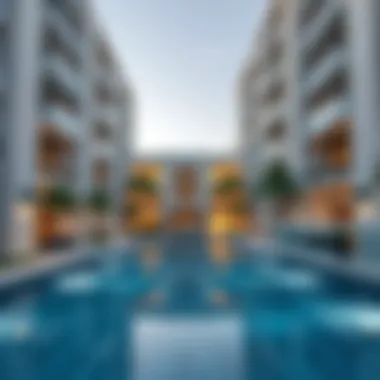
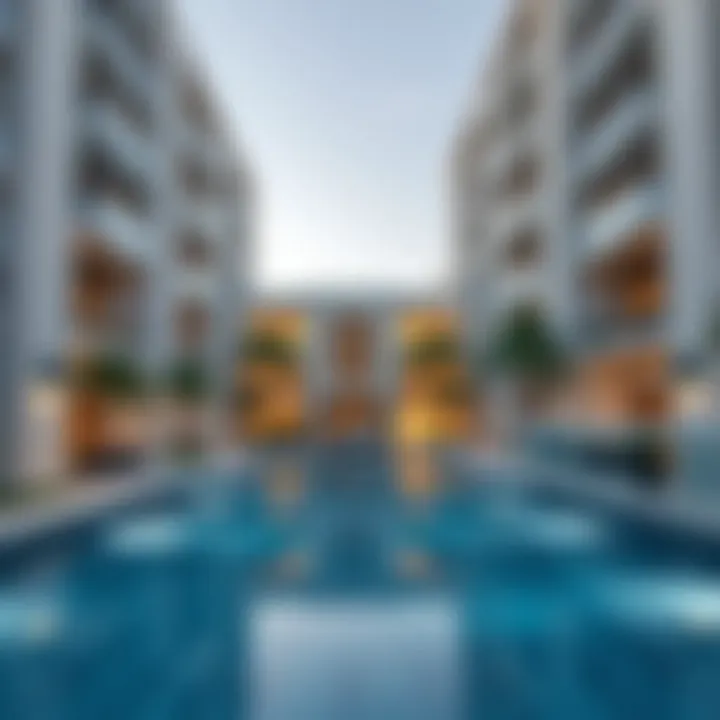
Intro
Living in Dubai is a dream for many, yet it comes with a unique set of challenges and considerations. From a rich tapestry of cultures to a vast array of property types, residents in this cosmopolitan city often find themselves navigating a complex landscape. Understanding the different housing options available, plus the legalities involved, is crucial for making informed decisions.
This guide aims to unravel the intricacies of residence here, whether you are an investor looking to dive into the market or an expatriate seeking a new home. By combing through various aspects related to property ownership, rental agreements, and lifestyle ramifications, we will paint a comprehensive picture of life's many facets in Dubai.
Moreover, we will keep you updated on current trends affecting the real estate market, potential investment opportunities, and how these components shape the living experience. You will leave this guide equipped with knowledge, ready to make decisions that align with your personal and financial aspirations.
Market Trends
Current Real Estate Pricing
Understanding the current real estate pricing in Dubai is essential for anyone considering living here. The market has transformed significantly over the years. As of late 2023, property values have been on an upward trajectory, driven by diverse factors including an influx of expatriates and the demand for modern amenities.
Average prices can differ markedly from district to district. For instance:
- Dubai Marina: Known for its luxury high-rises, prices here can soar, with apartments averaging around AED 2 million.
- Deira: A more traditional area, where smaller apartments can be found for AED 800,000.
The coastal view and lavish lifestyle add a premium to the price tags, making areas like Palm Jumeirah and Downtown Dubai the crown jewels of real estate. Yet, emerging neighborhoods, once merely affordable, have started to gain traction among buyers seeking value without sacrificing liveliness.
Emerging Neighborhoods and Developments
When talking about where to live in Dubai, emerging neighborhoods are where the action is. New developments are sprouting up, aimed at both homeowners and renters. Places like Dubai South and MBR City are getting a lot of attention for their modern infrastructure and economically viable housing options. In particular:
- Dubai South: Built around the Expo 2020 legacy, it is designed as a mixed-use development that supports both residential living and commercial spaces.
- MBR City: This rapidly growing area is becoming a sought-after destination due to its blend of luxury villas and apartment living.
These neighborhoods offer something for everyone, particularly those looking to invest in areas that promise growth and a quality lifestyle.
"The attractiveness of Dubai’s evolving neighborhoods lies not only in their price point but also in their amenity-rich environments, catering to diverse communities."
Investment Opportunities
Investing in Dubai's real estate can be a savvy move, but understanding how to approach it requires careful thought. Deciding between short-term and long-term strategies can dictate your level of involvement within this market.
Short-Term vs Long-Term Investment Strategies
Short-term investors often focus on flipping properties or engaging in vacation rentals. Areas like Jumeirah Beach Residence see great returns due to seasonal tourism.
On the flip side, long-term investors might prefer buying properties in more stable neighborhoods, where values are likely to appreciate over time. This means investing in locations like Jumeirah Village Circle or even older areas that are seeing rejuvenation. It all boils down to your financial goals and risk appetite.
Financing and Mortgage Options
Financing in Dubai has become more accessible, with banks offering a variety of mortgage options tailored to expatriates and locals alike. While obtaining a loan may seem daunting, knowing your options is half the battle. Here are common types of financing available:
- Fixed-rate mortgages: Offer stability in monthly payments, ideal for long-term planning.
- Variable-rate mortgages: These can fluctuate based on market conditions, which may work well for those wanting to capitalize on lower interest rates.
Understanding these facets enables potential investors to make informed and sound monetary decisions in the booming Dubai market, maximizing their chances of success.
Prolusion to Residence in Dubai
Understanding the nuances of residency and living arrangements in Dubai is pivotal in today’s globalized world, especially for those considering making the emirate their home or investing in its property market. With its booming economy and luxurious lifestyle, Dubai stands as a beacon for expatriates, investors, and homeowners alike. However, it’s not all glitz and glam—factors like types of residential options, legal frameworks, and market dynamics come into play, necessitating a thorough understanding.
The myriad of residential choices—from high-end apartments with breathtaking views to cozy villas in family-friendly neighborhoods—reveals the diverse lifestyles that Dubai offers. This exploration serves as a primer, helping individuals to navigate through crucial decisions regarding their living spaces.
Recognizing the importance of this topic, we can see how various elements impact residency:
- Quality of Life: Knowing what options are available allows one to align their lifestyle preferences with residential choices, impacting both personal contentment and long-term satisfaction.
- Investment Decisions: The understanding of Dubai's vibrant real estate market can significantly influence investment strategies, ensuring investors are better positioned to make sound financial commitments.
- Legal Insights: Grasping the laws surrounding property ownership and residency permits is essential; this avoids pitfalls and promotes informed compliance.
Thus, diving deeper into the specifics of residence in Dubai not only informs prospective residents about their options but also arms them with the knowledge to make prudent decisions. This groundwork sets the stage for a closer look into the fundamental aspects of the Dubai real estate landscape.
Types of Residential Properties


Understanding the types of residential properties in Dubai is crucial, especially for investors, homeowners, expatriates, and renters looking to navigate this dynamic market. Each option not only caters to different lifestyles but also offers various investment possibilities and returns. As Dubai continues to establish itself as a global hub, having a grasp of these categories can enhance decision-making, ensuring that potential residents find a suitable spot to call home.
Luxury Apartments
Luxury apartments in Dubai represent the pinnacle of urban living. They are typically located in prime areas, such as downtown Dubai or along the coastline, and boast world-class amenities and exquisite designs. Buyers and renters alike are often drawn to these residences due to their proximity to landmarks like the Burj Khalifa and Dubai Mall.
The benefits of luxury apartments go beyond aesthetics; they often provide unparalleled security, concierge services, and private pools or gyms. For investors, these properties can yield impressive returns, particularly in areas popular with expatriates or affluent individuals. While the initial investment may be substantial, the potential for rental income can make it worthwhile.
Villas and Townhouses
Villas and townhouses carve out a unique niche in Dubai’s residential landscape, frequently appealing to families seeking more space and a sense of community. These properties can be found in well-planned developments like Arabian Ranches or Dubai Hills Estate. Owning a villa often comes with a garden and outdoor area, a rare find in apartment living.
Investing in a villa can have its perks, like higher privacy and living space, which can be incredibly attractive for families or individuals who desire a quieter lifestyle. These homes also allow residents to indulge in local culture while enjoying a suburban atmosphere. However, prospective buyers must consider maintenance costs and community fees, which can be more significant than those associated with apartments.
Commercial Spaces and Mixed-Use Developments
Commercial spaces and mixed-use developments reflect the ongoing evolution of urban living in Dubai, blending business and pleasure in ways that enhance the living experience. Properties in areas like Dubai Marina and Business Bay are designed to cater to both residents and businesses, offering shops, offices, and housing under one roof. This not only feeds the local economy but also promotes a bustling community vibe.
Investors looking at commercial properties may find these mixed developments particularly attractive for their dual-purpose nature. Leasing options are often available for retail spaces, providing additional revenue streams. Additionally, with market trends leaning towards convenience, such developments are likely to remain popular with both residents and businesses in the long run.
Understanding Residency Laws
Understanding residency laws in Dubai is crucial for anyone eyeing the opportunities the city presents, whether it's investors, expatriates, or renters. Navigating these laws ensures that individuals grasp the framework in which they operate when it comes to property ownership and residency status. The importance of this knowledge cannot be overstated, particularly given that regulations can vary widely depending on your nationality, the type of property, and other factors.
Being well-informed allows you to maximize your investment and make well-thought-out decisions. From obtaining a residency visa to understanding the legalities behind property ownership, each element plays a significant role in determining one’s ease of settling into this vibrant city. If you're not careful, overlooking these laws can lead to unexpected hurdles, which could significantly impact your plans.
Visa Types and Requirements
Diving deeper, let’s shed light on the various visa types and their specific requirements. Generally, Dubai offers several options tailored to diverse need. Here are a few:
- Employment Visa: Issued by employers within the UAE, linking your residency to your workplace.
- Investor Visa: For those who invest a certain amount in UAE property, offering a pathway to residency.
- Property Owner Visa: When purchasing property that meets the financial threshold set by the government, one becomes eligible for residency, generally for a period of three years, with renewable options available.
- Student Visa: Granted to international students enrolled in accredited institutions within Dubai.
The application process can be somewhat tedious, as it involves documentation that might include your passport, proof of employment or investment, and a medical test report. It’s essential to have all the requisite paper trail in order.
To sum up, the proper visa not only grants you legal residency but also enhances the scope of your experience in Dubai. Without this, your ability to engage with the local economy, lifestyle, and even the banking system could be severely limited.
Legal Implications of Property Ownership
Property ownership in Dubai is a complex subject, influenced heavily by local laws and regulations. While foreign ownership is permitted in designated areas, there are legal implications that should not be brushed aside.
Some essential considerations include:
- Property Registration: You need to register your property with the Dubai Land Department. This process secures your legal claim and rights as a property owner.
- Freehold vs. Leasehold: Understanding the difference is critical. Freehold properties give outright ownership, while leasehold properties are usually rented for a specific number of years.
- Taxation: Although Dubai has no property tax, buyers should be aware of registration fees and service charges that can affect overall costs.
- Inheritance Laws: There are unique laws governing the inheritance of property, making it crucial for buyers to familiarize themselves with these regulations. Not knowing can lead to complications, especially in the event of an owner’s demise.
"Laws are like cobwebs, which may catch small flies, but let wasps and hornets break through." - Jonathan Swift
For further reading on specific visa types and the legal aspect of property ownership in Dubai, check out resources from the Dubai Land Department and Wikipedia on Residency Visas.
Investment Opportunities in Dubai Residence
Dubai’s residential market offers a unique tapestry of investment opportunities, attracting both local and international investors. Understanding these prospects is crucial for anyone looking to make informed decisions regarding property investments. The emirate’s consistently growing economy, favorable regulatory environment for property acquisition, and the allure of luxury living combine to create a fertile ground for investment ventures.
The importance of focusing on investment opportunities in this city cannot be overstated. Dubai not only serves as a hub for tourism and business but also boasts a complex real estate landscape ripe with potential. Whether it be in luxury apartments, villas, or emerging communities, each option presents an avenue for investors. Here, we will delve into emerging areas for investment, highlighting their unique benefits and considerations.
Emerging Areas for Investment
In recent years, several areas of Dubai have gained traction among savvy investors keen on leveraging the city’s real estate potential. Locations such as Dubai Marina, Jumeirah Village Circle, and Dubai Hills Estate are among the front-runners. Here’s a closer look:
- Dubai Marina: Known for its stunning waterfront views and vibrant nightlife, it attracts both homeowners and renters. The demand for rental properties in this area typically remains high, securing strong returns on investments.
- Jumeirah Village Circle (JVC): This locale has become increasingly popular due to its affordability and family-friendly environment. With a mix of apartments and townhouses, it offers a diverse range of options appealing to a wide audience. Investors are noticing the growth potential here, leading to greater interest.
- Dubai Hills Estate: Emerging as a premium location, it combines luxury living with accessibility to the city. The community is a blend of green parks, retail spaces, and residential units. Its investment appeal is bolstered by ongoing developments and the promise of high returns in the foreseeable future.
Given these areas, investors should also remain vigilant about the evolving market dynamics. New projects are often announced, and knowing where to invest can lead to exceptional opportunities. Some investors focus on purchasing off-plan properties, allowing them to benefit from competitive pricing before the project’s completion.
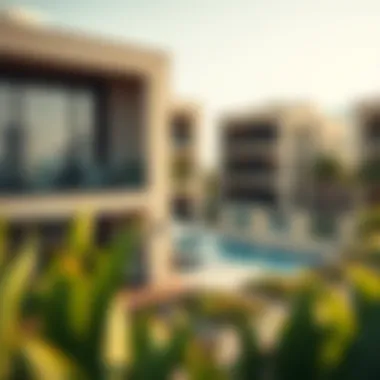
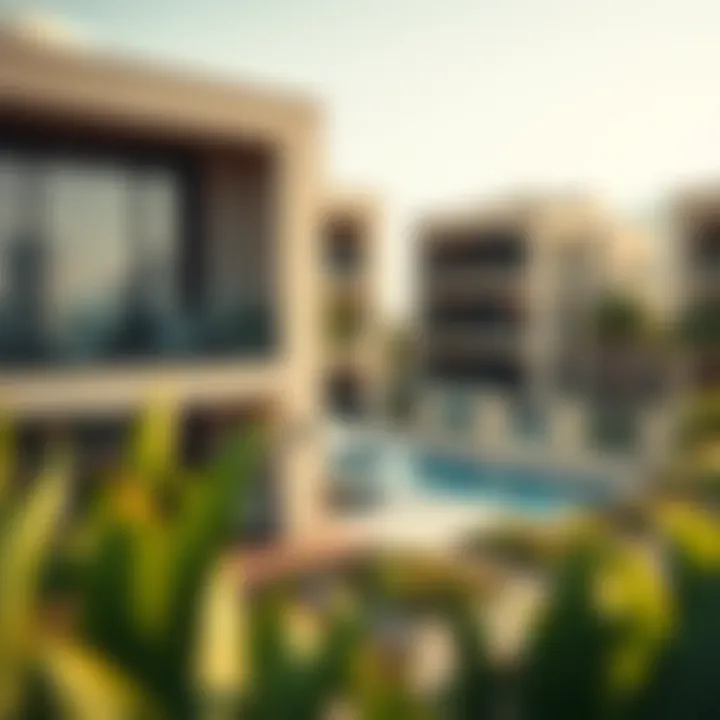
Return on Investment Considerations
When investing in Dubai’s residential market, assessing the expected return on investment (ROI) is paramount. Various factors contribute to determining ROI, as it takes more than just property value into account.
First, understanding rental yield is critical. This metric can differ widely across various locations within Dubai. Areas like Dubai Marina may showcase a higher rental yield compared to others. According to market reports, the rental yield can range from 5% to 8%, presenting attractive possibilities for investors willing to hold onto their properties longer.
- Market Demand: It’s vital to consider the local demand for rental properties in the selected area. Proximity to schools, amenities, and transport links greatly influences this demand.
- Market Trends: Keeping an eye on changing demographics and economic trends can also give savvy investors an edge. An influx of expatriates or evolving business hubs can signal potential growth.
- Maintenance Costs: Investors should also account for long-term maintenance and management fees, which can impact profitability. A well-managed property can help to mitigate these costs but should be factored in as part of ROI calculations.
In summary, a thorough examination of expected returns, growth potential, and ongoing expenses can paint a comprehensive picture of an investment's viability.
Rental Market Insights
Understanding the rental market in Dubai is crucial for anyone considering making this vibrant city their home. It offers valuable insights not only for renters but also for investors and real estate professionals. The dynamics of this market can reveal trends that enable you to optimize your choices, whether you're looking for a long-term residence or a suitable investment opportunity.
Rental Rates and Trends
The rental rates in Dubai fluctuate based on various factors such as location, property type, and market conditions. If you're eyeing the flashy Downtown Dubai, you might find that rental prices can go through the roof, with luxurious apartments commanding a premium. On the other hand, neighborhoods like Al Nahda or International City offer more affordable options but still provide a decent standard of living.
Here are some key trends shaping the rental landscape in Dubai:
- Supply and Demand: As new developments spring up, the market experiences an influx of rental properties. This can lead to more competitive prices. For example, the recent completion of Dubai Creek Harbour has increased supply, potentially stabilizing rental rates in the surrounding areas.
- Seasonal Fluctuations: Certain times of the year may see a rise in rental prices, particularly during the tourism season or around major events like the Dubai Shopping Festival. Renting property during offseason can sometimes yield better prices.
- Cultural Shifts: As more expatriates flock to Dubai, the demand for diverse and vibrant living options is increasing. Areas that were once considered off the main road are now gaining popularity, impacting rental prices positively.
According to real estate reports from local agencies (see resources from Bayut and Property Finder), the average rental rate for a one-bedroom apartment in Dubai Marina hovers around AED 90,000 annually, while the same can go for AED 60,000 in Jumeirah Village Circle. This variance highlights the importance of understanding the unique characteristics of each neighborhood.
Understanding Lease Agreements
Navigating lease agreements in Dubai can be a bit tricky for newcomers. It's not just about signing on the dotted line; understanding the nitty-gritty can save you from future hassles. Lease agreements generally range from one to three years, with many landlords preferring long-term tenants. Here are some vital points to consider:
- Terms and Conditions: Familiarize yourself with the lease duration, payment schedule, and maintenance responsibilities. It’s common for landlords to include provisions like a security deposit equivalent to one month's rent.
- Renewal Options: Discuss the lease renewal terms upfront. Often, landlords would like to keep good tenants but may increase rent substantially at the time of renewal. Negotiating this beforehand can save some heartache later.
- Notice Period: Be aware of the notice period for terminating the lease. Most agreements require a minimum of 30 days' notice, but this can vary, so check the specifics.
"Understanding your lease is as critical as choosing the right property; it can truly define your rental experience."
Getting a local real estate agent to help with lease agreements can smooth out this process. Agents usually understand the market nuances and can effectively advise you on terms that are fair and market-aligned.
For more insights on the legalities surrounding the rental market, resources like Dubai Land Department and RE/MAX provide comprehensive guidelines.
Lifestyle Considerations in Dubai Residences
Understanding lifestyle considerations in Dubai residences can help potential buyers, renters, and investors make sound decisions regarding property choices. The vibrancy of Dubai's lifestyle stems from diverse cultures, modern amenities, and lush community living. This section will discuss how these elements contribute to the residential experience in this bustling metropolis.
Amenities and Community Living
Living in Dubai often means accessing a wide range of amenities that enhance daily life. Many residential complexes come equipped with high-end facilities such as swimming pools, fitness centers, and dedicated children’s play areas. This rich array of features is designed to cater to a variety of lifestyles, ensuring that whether you're a fitness buff or a family-oriented individual, there’s something for you.
Beyond personal amenities, community living plays a crucial role in shaping your experience. Communities like Jumeirah Beach Residence promote a sense of togetherness; events, markets, and social gatherings encourage networking and friendships. Residents find it easier to connect over shared interests while enjoying the vibrant social life that Dubai offers. A significant motive for many expatriates is the tight-knit communities formed within these properties, providing a home away from home.
Here are some standout amenities typically found in Dubai residences:
- Swimming Pools: Perfect for relaxation or fitness.
- Gym Facilities: Often equipped with the latest equipment for all levels of fitness.
- Clubhouses: Great for socializing and hosting gatherings.
- Children’s Play Areas: Ensures kids have space to play and make friends.
- Landscaped Gardens: Provides green spaces for leisure and relaxation.
These amenities, coupled with community living, create a lifestyle that many find highly appealing.
Cultural and Societal Influences
Dubai's culture is as diverse as its population, offering a rich tapestry of experiences that can significantly influence residents' lifestyles. With over 200 nationalities represented, the city is a melting pot of traditions, beliefs, and customs. This cultural mosaic reflects in many aspects of residency - from communal celebrations to culinary options.
Societally, Dubai stands as a hub that promotes a luxurious yet pragmatic lifestyle. Events like the Dubai Shopping Festival or the Dubai Food Festival bring together communities to celebrate in grand fashion, while also providing opportunities for networking and business.
Understanding and respecting these cultural nuances is critical for harmony in communal living. For expats, engaging with local customs can ease the transition and foster deeper connections with neighbors. Additionally, many expatriate communities host cultural events that enable residents to share their heritage, enriching the overall social fabric.
To summarize, lifestyle considerations in Dubai residences encompass amenities, community living, and the cultural influences that make the city what it is today. Keeping these factors in mind establishes a solid foundation for making informed residential decisions in the ever-evolving landscape of Dubai.
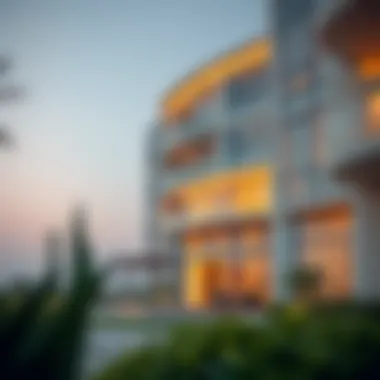

"The culture in Dubai is a vibrant mix of tradition and modernity, which creates an atmosphere that is both welcoming and dynamic."
For those looking to gain greater insights into Dubai's culture, you might want to check Wikipedia - Culture of Dubai.
As we delve deeper into the next aspects, the conversation will shift towards the regulatory frameworks that govern all these lifestyle choices.
Navigating the Regulatory Landscape
Understanding the regulatory landscape of Dubai is paramount for anyone looking to invest, reside, or rent property in this bustling metropolis. Navigating the rules and regulations not only ensures legal compliance but also enhances the overall experience of living in Dubai. Knowing how the local government operates, what laws exist, and what your rights and responsibilities are can save considerable time, money, and stress in the long run.
Local Government Regulations
Dubai’s local government enforces a myriad of regulations that impact housing, renting, and property ownership. The Dubai Land Department (DLD) plays a crucial role in facilitating property transactions and maintaining transparency in the market. Without navigating these regulations well, one might find themselves in a legal quagmire.
It�’s essential to be aware of the following:
- Property Registration: Every property transaction must be registered with the DLD. This includes sales, leases, and mortgages. Failure to do so can lead to disputes in ownership.
- Tenancy Laws: The Real Estate Regulatory Agency (RERA) has set forth laws governing leasing. These laws stipulate the rights of both landlords and tenants, ensuring that neither party is taken for a ride. For example, there are laws that limit how much rent can increase each year.
- Freehold vs. Leasehold: Know whether the property is freehold or leasehold. Freehold properties give full ownership to the buyer, whereas leasehold properties are owned by the landowner for a specified term, usually up to 99 years.
Understanding these local regulations offers several benefits:
- Investment Security: Knowing the rules protects your investment. Investors can feel more secure when they understand the transaction process and the associated risks.
- Avoiding Legal Issues: A thorough grasp of regulations can prevent costly legal disputes.
- Better Negotiation: Familiarity with the law allows for better negotiating power in lease agreements or property prices.
Compliance with Property Laws
Compliance with property laws in Dubai requires diligence and careful consideration. The laws are designed to foster a safe environment for both investors and residents, ensuring that properties are maintained and that transactions are conducted with integrity.
Here are some key areas of compliance to consider:
- Ownership Restrictions: While many nationalities can purchase property in designated areas, it’s vital to understand the ownership laws that apply. Foreign buyers are typically restricted to freehold areas, which the government designates to accommodate expatriates.
- Building Codes and Standards: Each property must adhere to specific building codes and safety standards. Understanding these is crucial, particularly for those looking into property development or renovation.
- Taxation and Fees: Be aware of any applicable taxes and fees associated with property transactions. This can include transfer fees and annual property taxes, which, while not substantial compared to other cities, should be factored into any budget or investment plan.
- Dispute Resolution: The Emirate of Dubai provides mediation services through the Rental Disputes Settlement Centre for any disagreements between landlords and tenants. Knowing this legal recourse can empower parties to resolve conflicts amicably.
"Familiarity with compliance not only fosters security but also gives a sense of belonging in a foreign land."
Future of Residence in Dubai
The future of residence in Dubai holds significant weight in understanding the overall dynamics of the city's real estate and living environment. Dubai, with its rapidly evolving landscape, is a magnet for investors, expatriates, and renters looking for promising opportunities. Such a multifaceted topic requires a closer look, taking into account market trends, innovation in residential development, and broader implications for those contemplating their living situation in the emirate.
As the city adapts to global shifts and local demands, it's crucial for stakeholders to stay ahead. Investors must analyze how predicted trends can impact their portfolios. Homeowners and expatriates can benefit from knowing where the market is heading to ensure wise decision-making. Understanding this landscape not only assists in individual choices but also gives insights into potential shifts in community and lifestyle that come along with such advancements.
Predicted Market Trends
The predictions for Dubai's real estate market trends suggest a landscape that is continually adapting. Experts foresee an increase in affordable housing options alongside luxury developments, catering to the diverse population. Such trends reflect a movement towards inclusivity in the market, aiming to attract a broader spectrum of residents.
- Increased Demand for Sustainability
People are increasingly conscious about their living environments. Trends point towards more environmentally friendly buildings and communities. Investors may want to consider properties that focus on green living, which is becoming a significant criteria in home buying decisions. - Rise of Shared Living Spaces
With a mix of cultures and lifestyles, shared living concepts are gaining traction, especially among the millennial demographic. Co-living spaces provide not only affordable options but also a sense of community, which can be appealing for expatriates or young professionals. - Integration of Smart Technology
Technological advancements are reshaping residential markets. From security features to energy efficiency, incorporating smart technologies is becoming a standard expectation. This trend enhances property values and provides better living experiences.
Overall, being aware of predicted trends allows potential buyers and renters to make informed choices, ensuring their investments align with the future of residence in Dubai.
Innovations in Residential Development
The innovations in residential development within Dubai are groundbreaking and multifaceted. This is crucial as the city strives to become a global hub not just for business, but also for quality living. Developers are continuously pushing boundaries, utilizing new materials and designs that cater to varied lifestyles while ensuring functionality.
- Modular Construction
One of the remarkable innovations is modular construction. This method allows for faster building times and can result in cost-effective housing. It also offers flexibility in design, enabling homes to be tailored to the needs of the occupants more readily than traditional construction methods. - Mixed-Use Developments
There is a growing trend toward mixed-use developments, where residential units seamlessly integrate with commercial spaces. This creates an urban feel, allowing residents to have shops, cafes, and recreational spaces right at their doorsteps. This promotes a vibrant lifestyle and community engagement. - Focus on Community Aesthetics
Developers are also paying attention to the aesthetic value of neighborhoods, creating inviting public spaces and parks. Such developments not only enhance quality of life but also increase the desirability of the area, making it beneficial for property values over time.
Ending
In concluding this exploration of residence in Dubai, it becomes clear that understanding the intricacies of living in this vibrant city is essential for anyone considering making it their home. The residential landscape here is dynamic, marked by diverse property types, legal requirements, and unique lifestyle aspects that shape the experience of living in the emirate.
Summarizing Key Insights
Several pivotal insights emerge from our discussion:
- Diverse Residential Options: From luxury apartments in Downtown Dubai to expansive villas in quieter neighborhoods, the choice of housing is vast. Each option offers a different flavor of Dubai life, catering to various tastes and budgets.
- Legal Framework: Navigating the laws surrounding property ownership and residency visas is fundamental. It influences not only where one can live but also what benefits come with residence status.
- Investment Landscape: For investors, understanding the potential returns and emerging areas for investment offers opportunities to tap into the market's growth.
- Cultural Nuances: The lifestyle in Dubai is influenced by a unique blend of cultures, and choosing where to live can significantly impact one's quality of life.
"Understanding these facets is crucial for making informed decisions that align with one's lifestyle and financial goals."
Final Thoughts on Residential Choices in Dubai
Ultimately, the decision of where and how to live in Dubai is deeply personal and should reflect individual needs and aspirations. Whether one is an expatriate seeking a new beginning, a homeowner investing, or a renter looking for the right community, this city offers something for everyone. The vibrant neighborhoods, coupled with an increasingly accessible real estate market, make it an exciting place to reside.
As the city continues to evolve, staying informed about market trends and legal updates will remain essential. Overall, understanding the multifaceted nature of residence in Dubai allows individuals to navigate this landscape with confidence, ensuring that their experience in this global hub is both rewarding and fulfilling.



